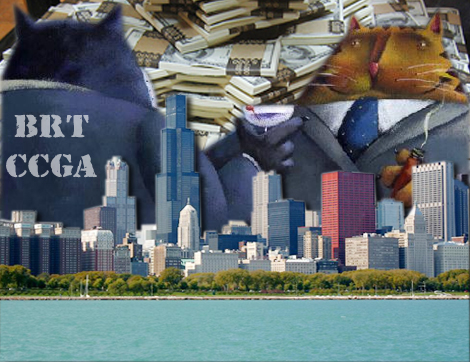
• Global plutocrats, fat cats, money-bags and magnates convene in Chicago
By Mark Anderson
The Business Round Table (BRT) is a plutocratic group that exerts its influence on critical United States issues such as raising the debt ceiling and keeping Obamacare alive. It is also a significant force for globalization. And as improbable as it may sound, the city of Chicago, where the BRT recently concluded a key economic summit, is fast becoming “globalism central” for the denizens of private governance.
The Trans-Pacific Partnership—which if approved would be the most expansive free-trade pact in human history—was a central topic at this BRT summit, tellingly called the “Frontiers of Economic Integration.” The main invitation-only confab was held October 30 at the Federal Reserve Bank of Chicago and hosted by the Chicago Council on Global Affairs (CCGA).
The CCGA, which has long been reconfiguring traditionally working-class Chicago into a global city, is the former Chicago Council on Foreign Relations, a cousin of the granddaddy tax-exempt think tank called the Council on Foreign Relations (CFR) of New York. Since its formation in 1921, the CFR has championed the Federal Reserve System, foreign wars, free trade and the creation of the UN, the World Bank and the International Monetary Fund. Its members and former members always turn up in key government, academic and media positions.
Interestingly, the proposed European Union-U.S. Free Trade Agreement—a suspected Bilderberg group topic last June in the UK—also turned up on the BRT’s Chicago agenda. This past spring, the very same trade pact was pushed at a Brookings Institution program covered by this newspaper. As if that isn’t enough, North Atlantic Treaty Organization (NATO) Secretary General Anders Fogh Rasmussen visited Chicago on September 30 to address the CCGA, recalling that when he was Denmark’s prime minister, he helped integrate the Danish people into the EU, which is increasingly becoming a debtor’s prison. As Rasmussen told the CCGA, he now wants to see a first-ever EU-U.S. free trade deal and a more global outlook for NATO than ever before.
Rasmussen also stressed the importance of the seemingly sacred “trans-Atlantic bond,” which, he said, means that the U.S. must reaffirm “its engagement in European security.
“You might call [this] economic partnership the ‘economic NATO,’” Rasmussen said, doing his part in telegraphing to other internationalists that globalization’s leaders are reading off the same page.
Mark Anderson is AFP’s roving reporter. Listen to Mark’s weekly radio show on the AMERICAN FREE PRESS RADIO NETWORK.


